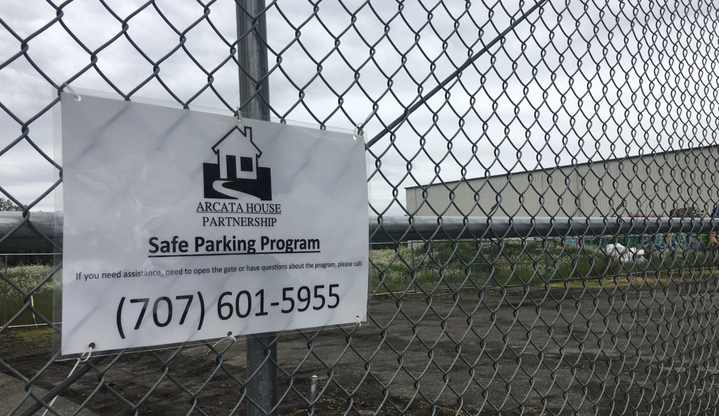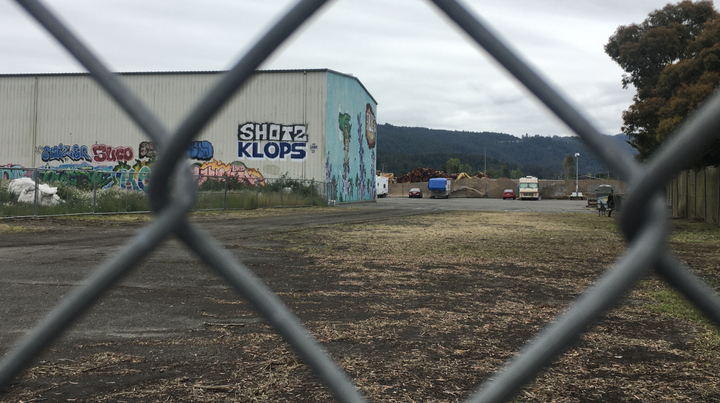The site of the new Safe Parking Program, near the site of a previous encampment which has now been cleaned up | Photos: Stephanie McGeary
Arcata Police Department release:
The Arcata Police Department recently took part in a collaborative effort to transition people from an encampment on Samoa Boulevard into other forms of housing where food and services would be readily available. The encampment sprung up in a short period of time after it was announced that a Safe Parking Program would launch in the near future at 1680 Samoa Boulevard. As word spread several motorhomes and other vehicles began to park in a shoulder area adjacent to the property.
The location of the encampment
As can be the case with vehicle encampments the area soon became overrun with trash and human waste. Many of the vehicles parked there were dilapidated or inoperable and within weeks the area became a dumping ground for more vehicles that were inoperable and towed there where they were left abandoned. These became uninhabitable shelters for those without housing. This condition was unhealthy, unsafe, inhumane and not sustainable.
The Arcata Police Department developed a plan to work with community partners to offer shelter, food, healthcare and behavioral health services as well as other basic needs to anyone at the encampment. Over the course of several months Officers worked alongside client services personnel from many local agencies to transition people from the filth and waste infested conditions they were currently in, to an environment that provides basic needs in a clean, welcoming, service oriented and compassionate manner.
Arcata Police Department officers engage in this interaction with homeless people on an on-going basis. For decades we have assisted our region with managing the homeless crisis. There have been many lessons learned and changes in the law. The expertise developed over time by APD Officers as well as their critical thinking, interpersonal and active-listening skills and their commitment to promoting the basic right to a dignified existence for all human beings is our compass. We apply our expertise in a way that we think will ultimately lead someone to services. We know however, that many people will refuse the services provided. Some eventually accept services, perhaps incrementally, but many will never avail themselves of basic services in a sheltered environment.
As we do with all encampments, my officers approached this encampment with services as the goal. That is why we worked for months to build trust through relationships in hopes that all people would accept what is readily available to them in a region of California that is working hard to get every unhoused person off the streets. We knew many of the people staying at this encampment and have navigated them through the services schematic many times before. While we knew what many of the answers would be my Officers continued to visit the site daily hoping that those who refused services would be at a place where they were ready to accept.
There comes a point where the health and well-being of those staying at encampments and the surrounding neighborhood must be prioritized, if not by the individuals themselves then by the very mechanisms in place to assist them; to include the Arcata Police Department. After many months and countless visits of providing compassionate outreach the problem continued to grow as did the volume of complaints. APD leveraged existing laws to post each vehicle with a warning that the vehicle could be towed if left parked. Prior to that we engaged in a month’s long campaign to listen to every person at the encampment and inform them, repeatedly, that they could not remain parked there long-term and re-iterated our commitment to work with them to develop a safer and healthier living arrangement.
The property was cleared of all vehicles and trash as Arcata Police Department Officers orchestrated the implementation of a series of sequential steps designed to help those in need and restore the property to its original condition. Each new step built upon previous steps already taken. Communication with those associated with each vehicle was key so that everyone understood what alternatives there were to staying on this road shoulder and what the ultimate resolution was going to be. The goal was achieved and additional insight and expertise was gained that further cements our organizational commitment to “providing outstanding service to the diverse and unique community we serve.”
Our plan from the beginning never included an enforcement component. Our sights were set on resources. For those who refused we would work with them, as we always do, on alternative housing options. APD is grateful to all municipal, county and community partners who assisted in this effort. This is very difficult and noble work that many community members continue to devote their professional lives to.



CLICK TO MANAGE